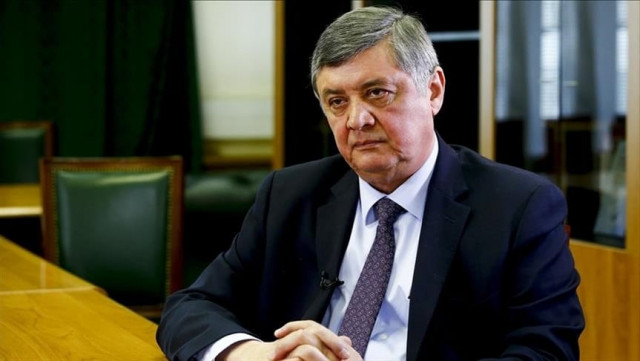Russia backs Pak, China Afghan policy
Moscow's envoy Kabulov says terrorism must be eliminated for regional peace

From Russia's perspective, the most dangerous international terrorist outfit is Daesh or IS-KP, but other militant groups also posed a serious danger to the region, like the TTP to Pakistan and ETIM to China, Russian special envoy for Afghanistan Zamir Kabulov said on Tuesday.
In an exclusive interaction with The Express Tribune, Kabulov stated that Russia was on the same page with Pakistan and China that the threat from these groups should not be underestimated, and must be eliminated, otherwise, these could harm the diplomatic ties with Beijing and Islamabad.
"We have the information that Pakistan and China regularly complain to Emirate-e-Islami on TTP and ETIM. While the Afghan regime always officially denied it, we believe that the two brotherly countries should resolve the issues bilaterally," Kabulov said.
"We confronted [Afghanistan] with the information that Islamabad has registered complaints about TTP and ETIM or the jihadist group multiple times. We believe that the Afghan government should be assisted enough to help curb the menace of militancy on Afghan soil," he added.
The Afghan government should address such irritating issues with its neighbouring countries amicably. "The Russian Federation is on the same page with Pakistan and China that these irritating issues could harm the diplomatic ties with Beijing and Islamabad," Kabulov stated.
Quoting from a statement of Russian Security Council Secretary Sergei Shoigu that the presence of 23,000 foreign terrorists on Afghan soil was alarming, he said: "We think that it's important that the Russian government helped Afghanistan to curb this menace."
The Russian special envoy stated that the decision to recognise the Afghan Taliban government was based not just on economic or political considerations, but also included the security consideration, as Moscow believed that strengthening the Kabul regime would help eliminate terrorism from Afghan soil.
"The main reason behind the Emirate-e-Islami Afghanistan's recognition is Moscow's desire to establish full-fledged political and economic ties with the new authorities of Afghanistan. It also aimed to ensure the security concerns of the neighbouring countries," he said.
"Factors behind the recognition aren't solely political, there are multiple reasons behind this decision," Kabulov said. "[It is about] safeguarding Russian investment in Afghanistan. We want a secure environment for our investments."
When asked about the recognition of the Kabul regime by other countries, Kabulov admitted that it would not be an easy decision for the international community. In this regard, he referred to the reservations expressed by countries like Pakistan, China, Iran, India and others.
He said that China hasn't recognised Afghanistan formally, but received their ambassador and accepted the diplomatic credentials. Pakistan also elevated the status of the Afghan envoy to ambassador, which is a green light towards recognition, he added.
However, he continued, Russia adopted a more traditional way and started inter-governmental and inter-state relationship. The Russian special envoy supported the trilateral process between Pakistan, China and Afghanistan but stressed that for now Moscow doesn't plan to join this process.
"We don't have any plan to be part of the tripartite process. Afghanistan is a common issue of the Eurasian countries, they support Islamabad and Tehran on their approaches on the diplomatic front, which isn't different from the Moscow format," he said.
"We believe that consultations are fruitful on Afghanistan. We support such contacts from regional states on Afghanistan," he said. "We believe that establishing economic and political ties with Afghanistan will diminish terrorist threats."
Responding to another question about what benefits Moscow would have from recognising the Afghan Taliban regime, Kabulov believed that at present, it would be too early to measure any benefits, stressing that the outcome of any diplomatic engagement takes years.
Russia and Afghanistan can reap mutual benefits including economic growth and progress in industrial and agricultural sectors. So, in the years to come, he added, "we would jointly assess the benefits for both the countries."
Kabulov highlighted that Russian investment in Afghanistan would also benefit its immediate neighbours, Iran and Pakistan. He stressed that Afghanistan had an important geographical location in the region. "Pakistan will also benefit from the Russian investment in the region."
The Russian envoy supported Chinese projects in Pakistan and Afghanistan. "Chinese projects will develop Pakistan's economy," he said, alluding to the China-Pakistan Economic Corridor (CPEC). "I heard that Kabul also welcomes such offers from Beijing. We supported such projects from China."
In the end, according to Kabulov, Afghanistan would benefit the most from the CPEC project, as the country served as a bridge between South Asian and Central Asian states and onward to Eurasian nations. Russia has termed CPEC a positive economic engagement, he said.
The envoy expressed his grief over the fatalities in the earthquake in five provinces of Afghanistan. He expressed condolences to the Afghanistan government on the loss of human lives and human suffering because of the natural disaster that struck on Sunday.
Speaking about the repatriation of Afghan refugees, he explained that Russia and Afghanistan have relations on a bilateral basis; therefore, Kabul had not discussed the refugee issues with Moscow. However, he said that Russian investment would help create jobs in Afghanistan.




















COMMENTS
Comments are moderated and generally will be posted if they are on-topic and not abusive.
For more information, please see our Comments FAQ